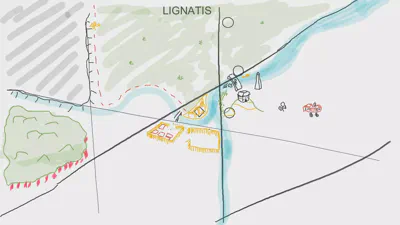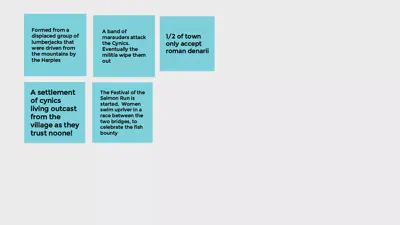(Whoops, forgot to publish this!)
Finally got round to playing Ex Novo! Like The Quiet Year, you’re telling the story of a settlement. This time though, that settlement can be large or small, and take place over many many years.
We ran it for a small town on the edge of a slightly-more-magical Roman empire.

The very broad summary of the game:
- Decide the complexity
- Divide a map into random regions1
- Add some geography
- Do some set up prep
- Name the town
- Roll 3d6 and follow the event prompts a set number of times
- Do any tidy up
Players take it in turns to do a part of each of these steps. The theme of the story is your choice, and should be agreed at the beginning. Euro-fantasy, sci-fi, something new, anything in-between. The events try to be generic.

The village settled here to avoid the harpies to the west. It grows cabbages to the north, fish in the river, and develops an academy on the hill to the east (a resource of knowledge). It grows to the south, and develops a festival where the women of the town swim in a race upstream between the bridges. There are two factions, split between those who want to join the Roman empire approaching, and those who wish to remain independent.
And, that’s kinda it. Maybe we didn’t play long enough? You can choose a complexity for your game, and we chose low options to be sure the game would finish. That it did, but much like short games of The Quiet Year, the complexity hadn’t built enough to make a memorable story.
Tools
For this one I used Google Jamboard2 as I hadn’t found Owlbear Rodeo, or indeed any VTT as good as Roll20 for just letting you and all the players draw on the same screen with different colours and still move tokens around.
It’s alright, you get 8 fixed colours. It’s not as good as Roll20 still, but better than Owlbear Rodeo.
Lessons
I had browsed through the PDF before running it, but that’s not quite enough to ground things in. I’m still not sure what some of the tokens are for. I would say though: I’m not sure it matters, if you’re having fun.
Which we did.
In some ways I liked it more than The Quiet Year - this feels more casual. As written, you’re supposed to play TQY with very little conversation, taking “Contempt tokens” in lieu of moaning at each other’s plays. I can see that it prevents a player dominating the game. I generally try to remain quiet until I see someone struggle, then offer two opposite suggestions. Anecdotally, most people I’ve discussed with have played TQY in a more conversational style anyway. It does make it slower though.
Something I found very appealing about Ex Novo was the ease with which one could scale the length of the game. TQY needs a bit of mangling as some cards can’t be skipped. However shorter games (of either) don’t have the same depth of story, for obvious reasons.